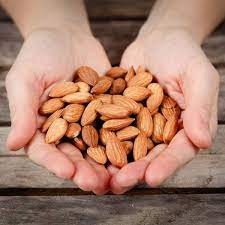Eating almonds daily can have numerous benefits for people’s health, many of them unknown to many. These nuts are a great source of nutrients that should be taken advantage of, and for this reason it is important to know what happens to Spaniards who eat almonds daily.
The Spanish Nutrition Federation (FEN) emphasizes that they are rich in essential nutrients, containing proteins, fiber, monounsaturated and polyunsaturated fatty acids, as well as a wide variety of vitamins and minerals. Among the latter, we must highlight its content of calcium, zinc, potassium, phosphorus, iron, vitamin E, niacin, folates, thiamine and riboflavin.
What happens if you eat almonds every day?
Eating almonds daily is an excellent way to satisfy hunger and thus avoid being tempted to snack between meals. Thanks to their high fiber and protein content, these nuts provide a feeling of satiety, which helps control appetite and, therefore, maintain a healthy weight. For its part, its high fiber content makes it an ideal food to improve digestive health and combat constipation.
The monounsaturated fats that are present in this nut also have cardiovascular benefits, as they are fats that help keep cholesterol under control, keeping it within a healthy range and, therefore, reducing the risk of suffering from diseases. cardiac.
Their beneficial health properties do not stop here, since they are rich in minerals such as phosphorus, calcium and magnesium, all of which are essential for the maintenance and development of strong bones. Vitamin E and other antioxidants it contains can have a positive effect on cognitive health and helps prevent mental deterioration that is linked to age.
However, although it is highly recommended that they be part of our regular diet, they should not be consumed excessively. Almonds have a significant caloric value given their high fat content, even though they are healthy. This is why a serving of a handful (approximately 25 grams) is recommended, which helps provide 42% of the recommended daily allowance (RDA) of vitamin E and 18% of the recommended phosphorus intake.
How to include almonds in your diet
There are multiple different ways to include almonds in your daily diet, since they can be eaten as a snack or added to other preparations such as salads, in bread recipes and, of course, in desserts. Likewise, it is a healthy and interesting option to enrich yogurts and smoothies.
Almonds are a very versatile nut that can be taken both at breakfast time and as a snack between meals. It is very beneficial to use this nut in the morning, since this way you can ensure that you ingest the necessary nutrients to to be able to face the rest of the day with greater energy and in better conditions.
The best nuts for health
Nuts are a favorite snack for many, while others prefer to avoid them due to their fat content and energy density. However, as is the case with almonds, their numerous nutrients and beneficial properties make them highly recommended to be part of our diet. Beyond these, it is worth mentioning other nuts loaded with health benefits:
- Walnuts: walnuts are one of the most consumed nuts, not surprising given that they have antioxidant effects that help prevent cells from aging, and thanks to their polyunsaturated vegetable oils they are effective in preventing cardiovascular diseases. Likewise, they are rich in fiber, and vitamins A, B1, B6 and E.
- Pistachios: they are nuts with a high energy value, rich in fiber and minerals. They are one of those healthy nuts that help reduce bad cholesterol, and also include antioxidants that contribute to strengthening blood vessels.
- Hazelnuts: Originally from Asia, hazelnuts have grown in consumption over time in countries such as Turkey, Italy and the United States. Their high caloric intake helps to recover energy quickly, but they should be consumed in moderation. This dried fruit is rich in vitamin E, which has antioxidant effects, in addition to standing out for its calcium content, which makes it a perfect option to prevent diseases such as osteoporosis.
- Peanuts: Along with walnuts, peanuts are one of the best nuts for brain health. Its folate content prevents cognitive deterioration, while its contribution of vitamin E and folic acid is perfect for vegetarians. Likewise, it has advantages on cardiovascular health, reducing cholesterol and triglycerides.
- Cashews: Finally, we are going to mention cashews, a very nutritious food rich in minerals such as potassium, phosphorus or magnesium, in addition to containing folic acid, vitamin E and vegetable proteins. Although 50% of their composition is fat, they are of good quality and healthy, being considered one of the best nuts to combat cholesterol.
All of them are ideal healthy options to include in the diet, but it is necessary not to overdo it and, therefore, not exceed the recommended daily intake.













